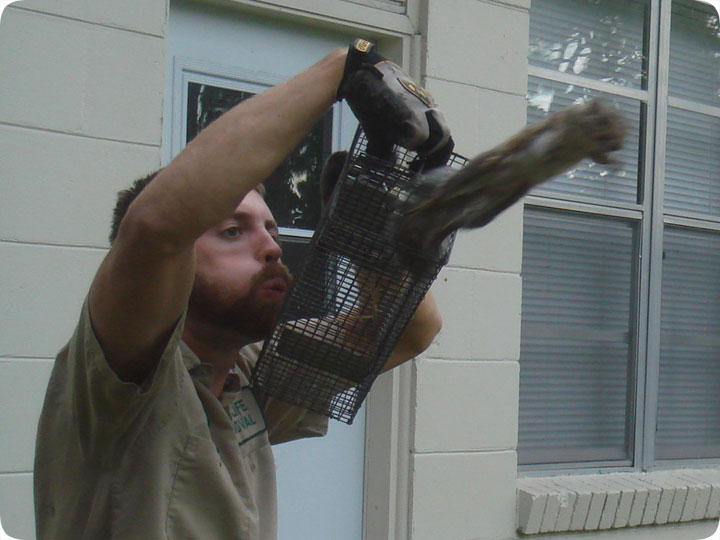-
info@aaanimalcontrol.com
Call us for help in your town
Humane Wildlife Education
Squirrel Relocation

Most of the time, I relocate animals about 20 miles outside of the city to a wilderness preserve area. However, I was set to leave Orlando for a few days, and I had no other animals to relocate, so I released this one in my back yard. Of course, this was over ten miles from the capture site, and I wouldn't relocate an animal close to where I caught it, or it would go right back to causing the same problems it was causing in the first place.
I don't mind releasing squirrels in urban areas. Squirrels are largely suburban animals as it is, and they might do a better job of surviving in familiar territory. It's true that relocation can be hard on any animal. It's lost its home, and its territory, where it knew how to find food and water sources. Now it's in an new and unfamiliar area, where it doesn't know anything, and where it may have to compete against established squirrels. Squirrels do tend to be territorial, but they don't live for a very long time. So I guess I'll see if this new squirrel thrives in my yard. I keep careful tabs on all the wildlife in my territory, and I'll know if this one sticks around and establishes itself or not. I have a feeling it'll have no problem locating the neighbor's birdfeeder across the street.
Do it yourself: Visit my How To Get Rid of Squirrels page for tips and advice.
Get professional help: Visit my Nationwide Pro Directory of wildlife removal experts.
The Eastern Gray Squirrel (Sciurus carolinensis), is one of the most widespread nuisance animals in the country. It lives throughout most of the United States. It is arboreal (likes to live in trees), but just as commonly atticeal (likes to live in attics). It's a member of the rodent family, and is prone to chewing and gnawing. Squirrels are active during the daytime, particularly morning and evening. They are active year-round. They give birth to two litters of young per year, in late summer and late winter, commonly inside buildings they've chewed into. They are very agile and great climbers, and are active animals. They are cute, but often destructive, especially when they enter an attic.
For more wildlife stories, click my Wildlife Blog, or click my below banner to hire a local trapper.





















